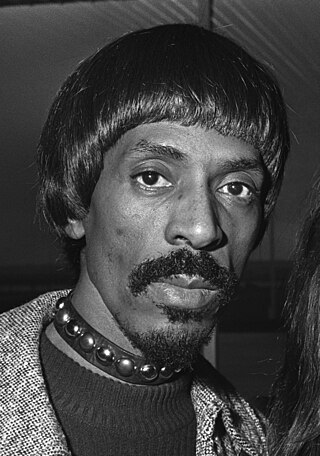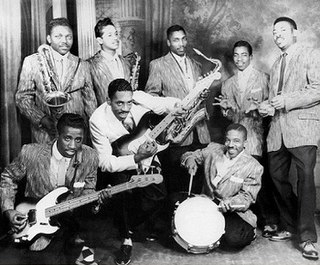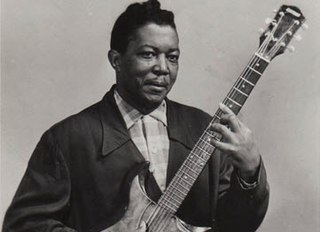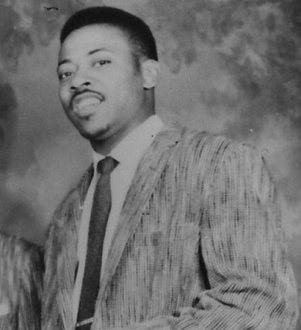Related Research Articles

Izear Luster "Ike" Turner Jr. was an American musician, bandleader, songwriter, record producer, and talent scout. An early pioneer of 1950s rock and roll, he is best known for his work in the 1960s and 1970s with his wife Tina Turner as the leader of the Ike & Tina Turner Revue.

"Rocket 88" is a song that was first recorded in Memphis, Tennessee, in March 1951. The recording was credited to "Jackie Brenston and his Delta Cats"; while Brenston did provide the vocals, the band was actually Ike Turner and his Kings of Rhythm. The single reached number one on the Billboard R&B chart.

Gustavus Cannon was an American blues musician who helped to popularize jug bands in the 1920s and 1930s. There is uncertainty about his birth year; his tombstone gives the date as 1874.

Ike & Tina Turner was an American musical duo consisting of husband-and-wife Ike Turner and Tina Turner. From 1960 to 1976, they performed live as the Ike & Tina Turner Revue, supported by Ike Turner's band, the Kings of Rhythm, and backing vocalists, the Ikettes. The Ike & Tina Turner Revue was regarded as "one of the most potent live acts on the R&B circuit."

Kings of Rhythm are an American music group formed in the late 1940s in Clarksdale, Mississippi and led by Ike Turner through to his death in 2007. Turner would retain the name of the band throughout his career, although the group has undergone considerable line-up changes over time.

Joe Willie "Pinetop" Perkins was an American blues pianist. He played with some of the most influential blues and rock-and-roll performers of his time and received numerous honors, including a Grammy Lifetime Achievement Award and induction into the Blues Hall of Fame.

Robert Lee McCollum was an American blues musician who played and recorded under the pseudonyms Robert Lee McCoy and Robert Nighthawk. He was the father of the blues musician Sam Carr. Nighthawk was inducted into the Blues Hall of Fame in 1983.

Jackie Brenston was an American singer and saxophonist who, with Ike Turner's band, recorded the first version of "Rocket 88" in 1951.

The Soul of Ike & Tina Turner is the debut album by Ike & Tina Turner. It was released on the Sue Records in February 1961. The album is noted for containing the duo's debut single "A Fool in Love" and their follow-up singles "I Idolize You" and "I'm Jealous."

Raymond Earl Hill was an American tenor saxophonist and singer, best known as a member of Ike Turner's Kings of Rhythm in the 1950s. He also recorded as a solo artist for Sun Records and worked as a session musician.

"Moanin' at Midnight" is a blues song written and recorded by Howlin' Wolf in 1951. The recording was released on Chess Records as his debut single. It charted on Billboard's R&B chart, but the B-side, "How Many More Years," became the popular side of the record.
Clayton D. Love Jr. was an American blues pianist, who led his own band, the Shufflers, in the early 1950s. He was later a vocalist in Ike Turner's band, the Kings of Rhythm.

Rocks The Blues is the first album credited to musician Ike Turner. Released in 1963 from Crown Records, it contains mostly previously released singles from the 1950s.

The Sun Sessions is a collection of early recordings that musician Ike Turner and his band the Kings of Rhythm recorded from 1951–1958 for Sun Records. Many of the recordings were previously unissued until Charly Records released the album Sun: The Roots Of Rock: Volume 3: Delta Rhythm Kings in 1976. The tracks on The Sun Sessions were digitally remastered and released by Varèse Sarabande in 2001.

Takin' Back My Name: The Confessions of Ike Turner is a 1999 autobiography by American musician Ike Turner with British writer Nigel Cawthorne.

This article contains information about albums and singles released by of American musician and bandleader Ike Turner.

Ernest Ray Lane was an American blues pianist. He played various blues musicians and bands, including with Pinetop Perkins, Robert Nighthawk, Ike Turner, George "Harmonica" Smith, and Canned Heat. Lane also released singles and album as a solo artist.
Willie Kizart was an American electric blues guitarist best known for being a member of Ike Turner's Kings of Rhythm in the 1950s. Kizart played guitar on "Rocket 88" in 1951, which is considered by some accounts to be the first rock and roll record. The record is noted for featuring one of the first examples of distortion ever recorded; played by Kizart.

Billy Gayles was an American rhythm & blues drummer and vocalist. Gayles was a member of Ike Turner's Kings of Rhythm in the 1950s with whom he recorded for Flair Records and Federal Records as the lead vocalist. Gayles also backed various musicians, including Earl Hooker, Robert Nighthawk, Otis Rush, Albert King, and Richard Arnold "Groove" Holmes.
Johnny O'Neal was an American R&B singer best known as a member of Ike Turner's Kings of Rhythm. He also sang with blues guitarist Earl Hooker. O'Neal used various pseudonyms such as Brother Bell, Burntface Brother, and Scarface Johnny. As a solo artist he recorded for King Records and Sun Records in the 1950s. He also formed his own group called Johnny O'Neal and the Hound Dogs.
References
- ↑ Eagle, Bob L.; LeBlanc, Eric S. (2013). Blues: A Regional Experience. ABC-CLIO. p. 198. ISBN 978-0-313-34424-4.
- ↑ "Rosedale". Mississippi Blues Trail.
- 1 2 3 "Dennis Binder" (PDF). Erwig Music.
- 1 2 Turner, Ike. (1999). Takin' Back My Name: The Confessions of Ike Turner. Cawthorne, Nigel, 1951–. London: Virgin. pp. 59, 246. ISBN 1-85227-850-1. OCLC 43321298.
- ↑ "Dennis Binder". The Ponderosa Stomp.
- ↑ "Modern, Flair Add To Talent Rosters" (PDF). Billboard. May 8, 1954. p. 36.
- 1 2 3 4 5 6 Sebastian, Danchin (2010). Earl Hooker, Blues Master. Univ. Press of Mississippi. pp. 82–85, 124. ISBN 978-1-60473-900-8.
- ↑ Komara, Edward M. (2006). Encyclopedia of the Blues. Psychology Press. p. 82. ISBN 978-0-415-92699-7.
- ↑ "Dr. John, Ronnie Spector Set For Ponderosa Stomp". Billboard. February 11, 2008.
- ↑ "Reviews of New R&B Records" (PDF). Billboard. May 15, 1954. p. 32.
- ↑ "Reviews of New R&B Records" (PDF). Billboard. October 15, 1955. p. 50.